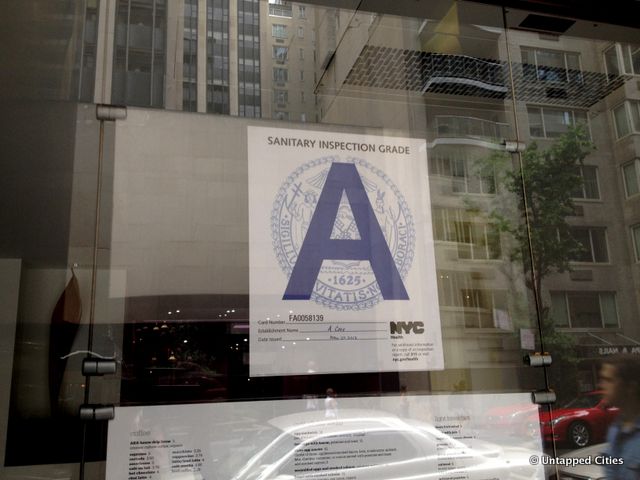Last-Minute NYC Holiday Gift Guide 🎁
We’ve created a holiday gift guide with presents for the intrepid New Yorker that should arrive just in time—


You’ve probably noticed the giant letters posted on the windows of restaurants in New York City, and perhaps vaguely understood that these letters are related to the cleanliness of the establishment. But do you know that this grading system works exactly?
The NYC Department of Health and Mental Hygiene (DOH) inspects close to 24,000 restaurants every year to monitor compliance with City and State food safety regulations. Since July 2010, the DOH has required restaurants to post letter grades showing sanitary inspection results. The DOH inspectors conduct unannounced visits to each restaurant at least once a year, and check for food safety factors such as food handling, food temperature, personal hygiene, facility and equipment maintenance, and vermin control.
Each fault on the side of the restaurant earns it a certain number of points depending on how severe the violation is in threatening human health. At the end of the visit all points are added up, and the lower the score, the better. Restaurants with a score between 0 and 13 points earn an A, those with 14 to 27 points receive a B, and those with 28 or more a C. Inspection results are posted on the DOH website, and iPhone and iPad users can now download a Restaurant Letter Grading app. The New York Times also has a really helpful, interactive map of the DOH Restaurant Ratings.
Violations fall into three types of categories that trigger higher point penalties depending on severity: 1) public health hazard (e.g.: improper food storage temperature); 2) critical violation (e.g.: not washing raw food like salad before serving); and 3) general violation (e.g.: not cleaning utensils properly). Each restaurant receives an initial inspection visit, which results in either an A score or a warning rather than a grade if it’s a B or a C. For B and C initial ratings, the subsequent inspections are unannounced and fairly soon after the initial visit. If on the second visit the restaurant has not improved to an A, it will receive both a grade card and a grade pending card and it can choose which one to post until it has been heard by the Office of Administrative Trials and Hearings Health Tribunal.
A June 2013 NY Daily News article revealed that over the past year, DOH fined close to 1,400 restaurants for hiding their city food inspection grades. 55% of the violators had received a grade of C, and each violator was fined up to $1000. Though the number of cheaters is high, at least the NYC restaurant grading system has some teeth. Compared to the same period last year, the number of restaurant owners caught for failing to post their grades dropped by 22.5 %. The most recent report from DOH that looked at the first 18 months of inspections implementations found other improvements as well: restaurants are more likely to hold hot and cold food at safe temperatures since grading began; and quite importantly, while 22% of restaurants still have signs of mice on initial inspection, this is a nearly one third improvement since before grading began, when 32% of restaurants had mice.
Read more from our Cities 101 series about how stuff works in the city.
Subscribe to our newsletter